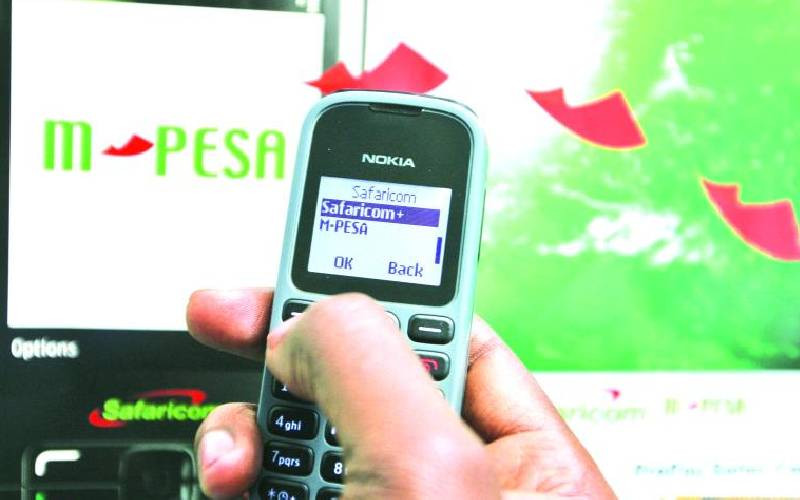
Safaricom’s Corporate Affairs Director, Stephen Chege
In Summary
- Analysts say huge investor appetite has been due to innovations and robust performance leading to the telco’s price rise to an all-time high of Sh25 per share
- Safaricom controls about three quarters of Kenya’s 40.5 million Internet users
- The telco also has presence in the insurance market. Its first stab at this segment was with Linda Jamii, a medical insurance product by Britam and a tech-based medical supplier Changamka
NAIROBI, KENYA: Early this month, Safaricom shares touched an all-time high of Sh25. The stock’s value has risen by about a third this year, driven by what analysts attribute to good financial performance of the telco.
But the mother of all stock market questions is whether the stock that started trading at the Nairobi bourse more than nine years ago has the momentum to sustain the rally witnessed so far.
At Sh25, the stock has risen ten times since its lowest ebb in early 2009, when it traded at Sh2.55 — half of its 2008 initial public offering price of Sh5.
Then investors were fearful, now they are greedy. Those who held on or bought the shares when they hit their lowest level are now reaping big.
At Sh25 per share, it pushed Safaricom’s market capitalisation — which is the total value of investor funds – to more than Sh1 trillion.
This valuation outstrips the combined capitalisation of the next 10 most valuable companies at the NSE among them East African Breweries Ltd (EABL) Equity Bank, BAT, Barclays, KCB, Co-operative, Stanbic, Standard Chartered and Bamburi.
Share fluctuation
The current rally is good news for shareholders who have patiently watched the share fluctuate in the market. Going by the Sh24.25 price at which it closed on Friday, Safaricom’s capitalisation jumped to Sh971.59 billion from a low of Sh102.1 billion in 2009.
Last Friday, total market capitalisation stood at Sh2.42 trillion, meaning Safaricom’s stock controls nearly half of the total shareholder wealth at the Nairobi bourse. The stock has been among the best-performing counters since the beginning of this year, with a price gain of about 34 per cent. It opened the year at Sh18.
So what is it really about Safaricom that is driving the share price? And is this the best time to cash out?
In answering these two questions, it is important to understand what Safaricom really is or what it may be maybe or will likely become in the next few years.
Analysts say it is the telecom firm’s strong financial performance, diversification into data and killer app M-Pesa — the mobile money transfer service that has changed the banking scene — that are credited to the stock rally. More than half of Kenyans are now using mobile phones to do their banking, creating room for the company to generate more cash.
Stay informed. Subscribe to our newsletter
Boasting more than 28.1 million subscribers as at March this year, the telco has managed to attract and retain customers despite increased competition from Airtel and Telkom Kenya.
The operator has upped its ante to grab a large share of the data business, investing more on fibre. Driving investor interest in Safaricom is the fact that the firm has proven that mobile money payments and transfer services are profitable and can be scaled up.
Safaricom is looking for ways to build on the success of M-Pesa, its mobile-phone money transfer service that dominates the Kenyan economy. M-Pesa is used by subscribers to pay for everything, from utility bills to groceries and car petrol.
The telco controls about three quarters of Kenya’s 40.5 million Internet users, while M-Pesa handled Sh432.5 billion of mobile commerce transactions in the first quarter of this year, more than half the total Sh627.5 billion, according to data by the Communications Authority of Kenya.
Its entry into insurance, education, transport, e-commerce and even into our living rooms through digital television, has helped power the firm’s growth prospects. In the last financial year, voice revenue grew by 2.9 per cent. But the growth is not as high as that of other revenue segments such as Internet and M-Pesa.
“We believe that data, M-Pesa and diversified products such as enterprise services will continue to enhance our bottom-line,” said Safaricom’s Corporate Affairs Director, Stephen Chege in an interview with Financial Standard.
In 2016 full-year results, non-voice revenue accounted for more than half of the over Sh200 billion gross revenue the telco generated. “We expect this trend to continue as we realise the heavy investment we are making in expanding our network and deploying the latest technology,” Chege added.
And a fortnight ago, when Safaricom stock touched its all-time high, the mobile phone services provider waded into e-commerce. Safaricom is entering the e-commerce segment, a market that has made billionaires. Amazon and Alibaba founders are examples of tycoons made from e-commerce. Jeff Bezos, the founder of Amazon, is the third richest person in the World with a net worth of $84.7 billion (Sh8.7 trillion).
Jack Ma, Alibaba’s founder is Asia’s richest person with a net worth of $37.8 billion (Sh3.9 trillion) and 14th richest person in the world. Globally, the e-commerce market is worth around $22.1 trillion (Sh2,210 trillion), according to the United Nations Conference on Trade and Development (UNCTAD) 2016 estimates.
This is the market that Safaricom is now eyeing. Safaricom says its e-commerce platform dubbed Masoko, Swahili synonym for markets, will offer products ranging from electronics to beverages and cosmetics.
Competitive pricing
This will provide a tool for people currently buying and selling goods on social-media platforms such as Facebook. “We see Masoko as being an ideal platform to connect people to new markets using technology. You will be able to source quality products at competitive prices and we will also offer reliable customer service,” Chege said.
Masoko will leverage M-Pesa as a payment platform but will also incorporate other payment options such as MasterCard and Visa.
In its foray into digital TV market, the telecom firm launched the Big Box — its own decoder — that combined voice, internet and TV. “We believe that the content segment has high potential for growth,” Chege said, adding that they plan to start generating their own content soon. “We continue to await a TV licence from the Communications Authority which will allow us to roll out an enhanced content service platform.”
The telco also has presence in the insurance market. Its first stab at this segment was with Linda Jamii, a medical insurance product by Britam and a tech-based medical supplier Changamka. However, it flopped due to some disagreements. “We gathered a great deal of insights from the Linda Jamii initiative,” Chege says.
Safaricom says it has since partnered with CarePay – a financial engagement firm that helps individuals manage health expenses — and PharmAccess (a non-profit organisation that seeks to make quality healthcare accessible in Africa) to provide a mobile based health savings product known as M-Tiba.
M-Tiba allows users to receive or save funds to pay for healthcare services at licensed healthcare facilities when demand arises. One can save as little as Sh10. Funds stored in M-Tiba are managed by UAP Insurance. The solution is now delivering access to healthcare services to close to one million Kenyans through over 400 health care providers. It has already paid out over Sh169 million in medical expenses for 100,000 visits.
The insurance sector, which has just about four in every 100 people on a medical or personal cover, is currently where the banking sector was two decades ago.
There is huge opportunity for growth, especially for firms that can innovate, and enable users - for instance pay premiums using their mobile phones.
In the transport segment, the telco entered the taxi hailing business. It partnered with Craft Silicon to launch Little to take on Uber. “Little takes no more than 15 per cent off drivers’ earnings compared to other players in the market who take between 18 per cent and 25 per cent,” Chege told Financial Standard.
The application allows passengers to access the service through Unstructured Supplementary Service Data (USSD). This is important as it gives access to all mobile phone users, not just smartphone owners.
Analysts say investors could be factoring in these innovations into the pricing of the stock. Standard Investment Bank head of research Francis Mwangi says the rally in the share price has been mostly due to the impressive financial results for 2016. “We saw good earnings performance in 2016 and management remains bullish of a positive 2017,” said Mwangi.
Safaricom posted a 27 per cent growth in net profit to Sh48.4 billion in the year to March 2017. Total revenue grew by 8.8 per cent to Sh212.9 billion. M-Pesa revenues grew from Sh41.5 billion to Sh55.08 billion while data revenues jumped 38.6 per cent to Sh29.29 billion. With these figures, you’ll struggle to get any other company that has managed to grow profits by the same amount during the same period.
“At current stock price levels, Investors seem to be saying they expect the company to continue innovating faster than its competitors and build-up on its current success to venture into new business lines - home internet and e-commerce,” Mwangi added.
This could also be the dividend. The book closure for their final 2016 dividend is coming up in early September.
The telco is expected to pay Sh0.97 per share in dividend, which is an increase of 27.5 per cent from the previous year. The proposed dividend payout amounts to Sh38.86 billion, which is 80 per cent of Safaricom’s net profit for the year.
Investment analyst Aly Khan Satchu says Safaricom’s share jump is more than 30 per cent total return this year. This is what has underpinned the Bull Rally at the NSE.
“Safaricom is on the radar of every international investor and occupies a unique investor mindshare globally,” Satchu, who is Rich Management chief executive, said. He notes that investors are excited with the growth and the outstanding cash-machine.
“I think investors need to factor in the fact that geographical expansion is now much more likely since Vodafone transferred its shareholding to Vodacom in effect making Safaricom a fully indigenous African Company,” he added.
He expects the share to continue rallying in the short term and has upgraded his target for this year from Sh28 to Sh32. Chege says East and Central Africa’s most profitable company will see the current price as reflective of the confidence investors have in the company’s strategy. “We continue to deliver value for our shareholders through enhanced efficiencies and growing existing as well as new innovations.”
 The Standard Group Plc is a
multi-media organization with investments in media platforms spanning newspaper
print operations, television, radio broadcasting, digital and online services. The
Standard Group is recognized as a leading multi-media house in Kenya with a key
influence in matters of national and international interest.
The Standard Group Plc is a
multi-media organization with investments in media platforms spanning newspaper
print operations, television, radio broadcasting, digital and online services. The
Standard Group is recognized as a leading multi-media house in Kenya with a key
influence in matters of national and international interest.
 The Standard Group Plc is a
multi-media organization with investments in media platforms spanning newspaper
print operations, television, radio broadcasting, digital and online services. The
Standard Group is recognized as a leading multi-media house in Kenya with a key
influence in matters of national and international interest.
The Standard Group Plc is a
multi-media organization with investments in media platforms spanning newspaper
print operations, television, radio broadcasting, digital and online services. The
Standard Group is recognized as a leading multi-media house in Kenya with a key
influence in matters of national and international interest.










